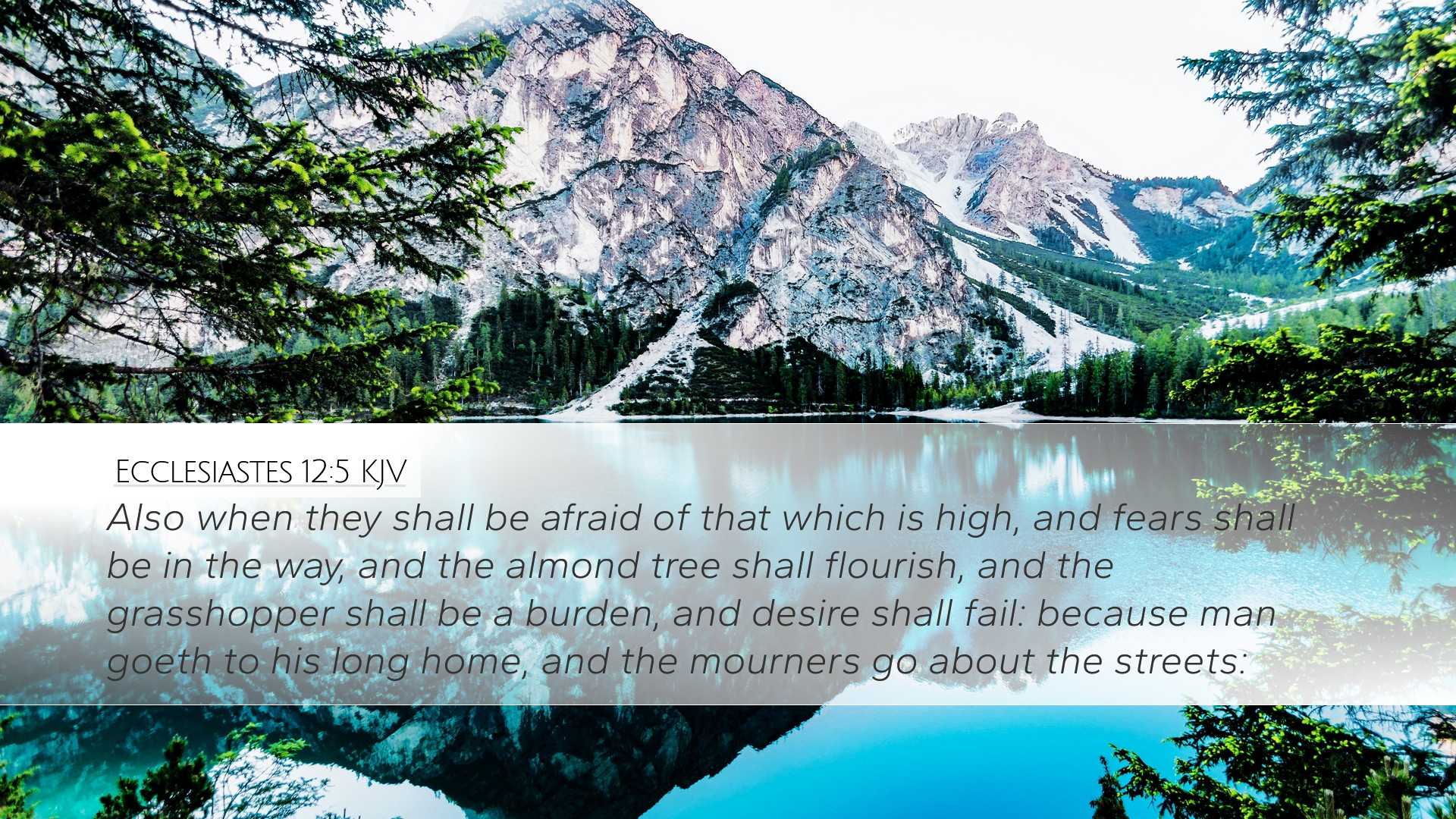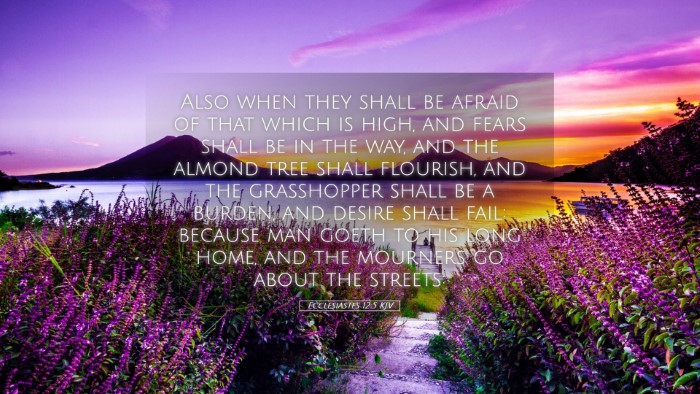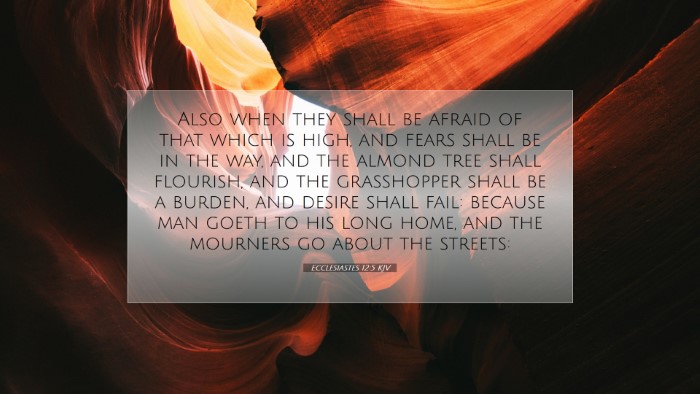Old Testament
Genesis Exodus Leviticus Numbers Deuteronomy Joshua Judges Ruth 1 Samuel 2 Samuel 1 Kings 2 Kings 1 Chronicles 2 Chronicles Ezra Nehemiah Esther Job Psalms Proverbs Ecclesiastes Song of Solomon Isaiah Jeremiah Lamentations Ezekiel Daniel Hosea Joel Amos Obadiah Jonah Micah Nahum Habakkuk Zephaniah Haggai Zechariah MalachiEcclesiastes 12:5
Ecclesiastes 12:5 KJV
Also when they shall be afraid of that which is high, and fears shall be in the way, and the almond tree shall flourish, and the grasshopper shall be a burden, and desire shall fail: because man goeth to his long home, and the mourners go about the streets:
Ecclesiastes 12:5 Bible Commentary
Ecclesiastes 12:5 Commentary
Verse Reference: Ecclesiastes 12:5 - "When they shall be afraid of that which is high, and fears shall be in the way, and the almond tree shall flourish, and the grasshopper shall be a burden, and desire shall fail: because man goeth to his long home, and the mourners go about the streets."
Introduction
The book of Ecclesiastes, often attributed to Solomon, offers profound reflections on the vanity of life and the inevitability of death. Chapter 12 serves as a climactic conclusion to the author’s contemplations, particularly focusing on the frail nature of human existence and the importance of remembering one’s Creator in the days of youth. Verse 5 employs vivid imagery to encapsulate the fears and burdens of old age, punctuating the transient nature of life.
Thematic Overview
This verse stands out through its rich figurative language and metaphorical references that serve to highlight the anxieties and struggles faced in one's later years. The fear of heights can signify the increasing limitations and vulnerabilities that accompany aging, while the mention of the almond tree flourishing can symbolize the stages of life and the inevitability of death. Furthermore, several commentaries underline the concept of desire failing as an emblem of diminished strength and vitality.
Commentary Insights
Matthew Henry
Henry provides a thorough exploration of the verse, asserting that it reflects the fears associated with aging and the physical deterioration that can come with it. He notes that the “high” places which might once have inspired excitement now induce anxiety and trepidation. This change illustrates the psychological shift that often accompanies growing older.
Moreover, Henry highlights the flourishing almond tree as a metaphorical expression for the latter stages of life, particularly how one’s destiny unfolds. The flourishing here symbolizes the growth of wisdom that can arise from experiences, yet Henry cautions that it also reminds us of the sadness and dependency that often follow. The grasshopper’s burden, being trivial and yet cumbersome, signifies how even small concerns can weigh heavily as one draws closer to the end of life.
Albert Barnes
Barnes contributes by interpreting fear and burdens as reflections of human vulnerability. He speaks to the physical aspects of life becoming burdensome as one ages, noting the significance of the "mourners going about the streets" as a poignant reminder of mortality. This line serves as an acknowledgment of the universal nature of grief that accompanies the end of life, as well as a call to remain mindful of our mortality.
Also, Barnes underscores the “desire failing” as a loss not only of physical ability but also the fading ambitions and aspirations that often characterize later years. He suggests that there is a natural waning in desires as one approaches death, which can evoke either a sense of peace or deep regret, depending on how life has been lived and the priorities that have been set.
Adam Clarke
Clarke further amplifies the discussion around the symbolism inherent in this verse, focusing on how each metaphor serves to depict stages of life. He interprets the almond tree as a sign of hope and renewal, in contrast with the burdensome grasshopper, which captures the duality present in life—joy mingled with sorrow, strength alongside weakness. Clarke emphasizes the important lesson that as one ages, the need for reliance on God becomes paramount, demonstrating how faith becomes a source of solace amidst life's inevitable challenges.
Life Application and Reflection
This verse is a poignant reminder for believers to reflect on their lives while still in the prime of youth, encouraging a proactive approach to spiritual and moral living. For pastors and theologians, it serves as a call to guide congregations in recognizing the fleeting nature of earthly pursuits and the eternal significance of one’s relationship with God. It invites all, regardless of age, to contemplate the legacy left behind as well as the importance of living with wisdom and foresight.
- Encouragement for the Youth: The youthful years are to be cherished and utilized wisely, not taken for granted.
- Preparation for Aging: Churches should provide resources and community support for adults dealing with greater anxieties as they age.
- Spiritual Reflection: Regular reflection on life choices and their spiritual implications can offer deeper peace and clarity in advanced years.
Conclusion
Ecclesiastes 12:5 encapsulates the profound realities of life, aging, and mortality within its succinct poetic language. The insights drawn from the commentaries of Henry, Barnes, and Clarke provide invaluable perspectives that aid in comprehending the complex emotions attached to growing old. They collectively remind us of the beauty of wisdom and the prevalence of fear that accompanies the journey towards life's culmination. For scholars, students, and clergy, this verse compels an ongoing dialog about purpose, legacy, and faith throughout the seasons of life.


